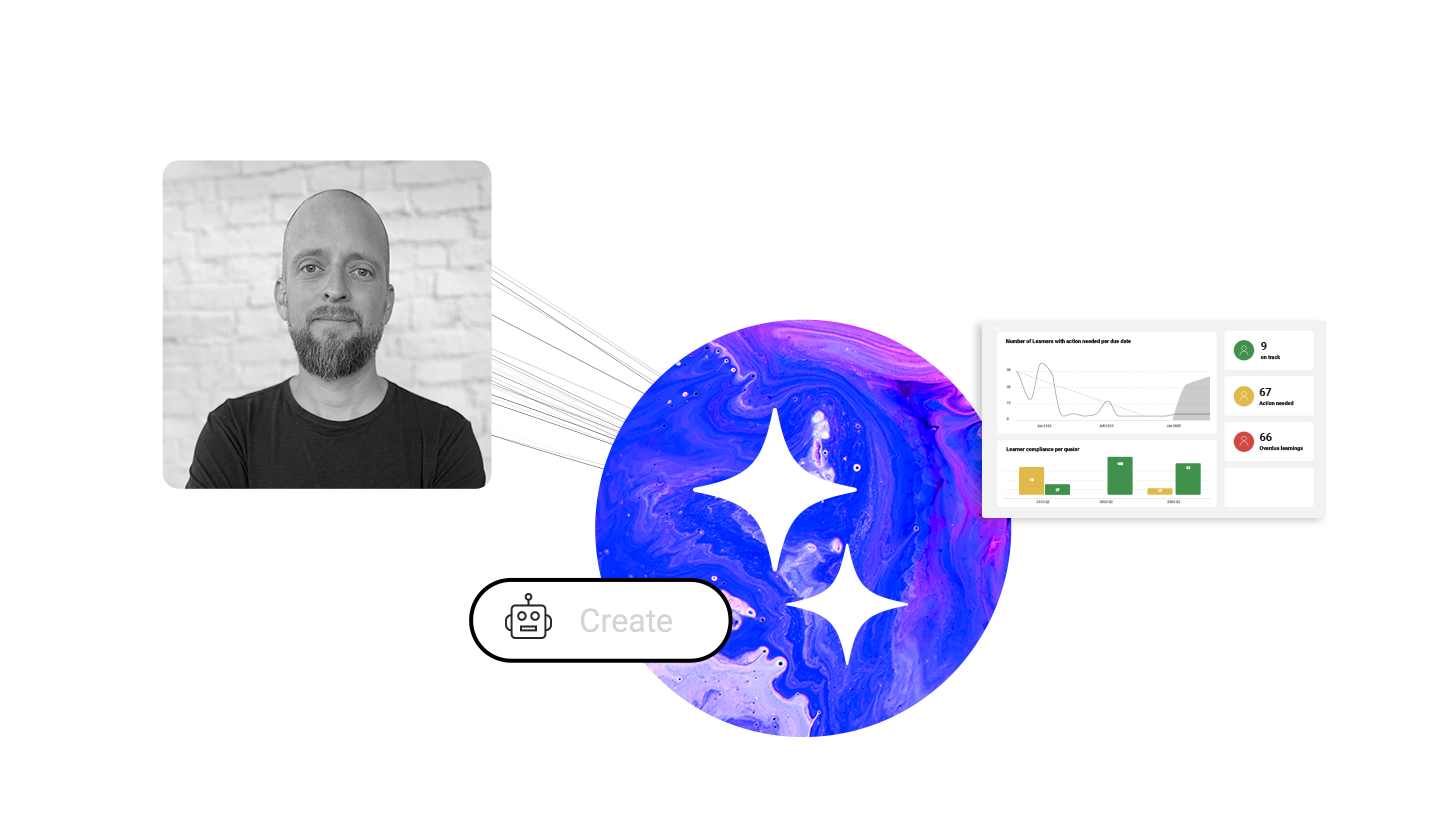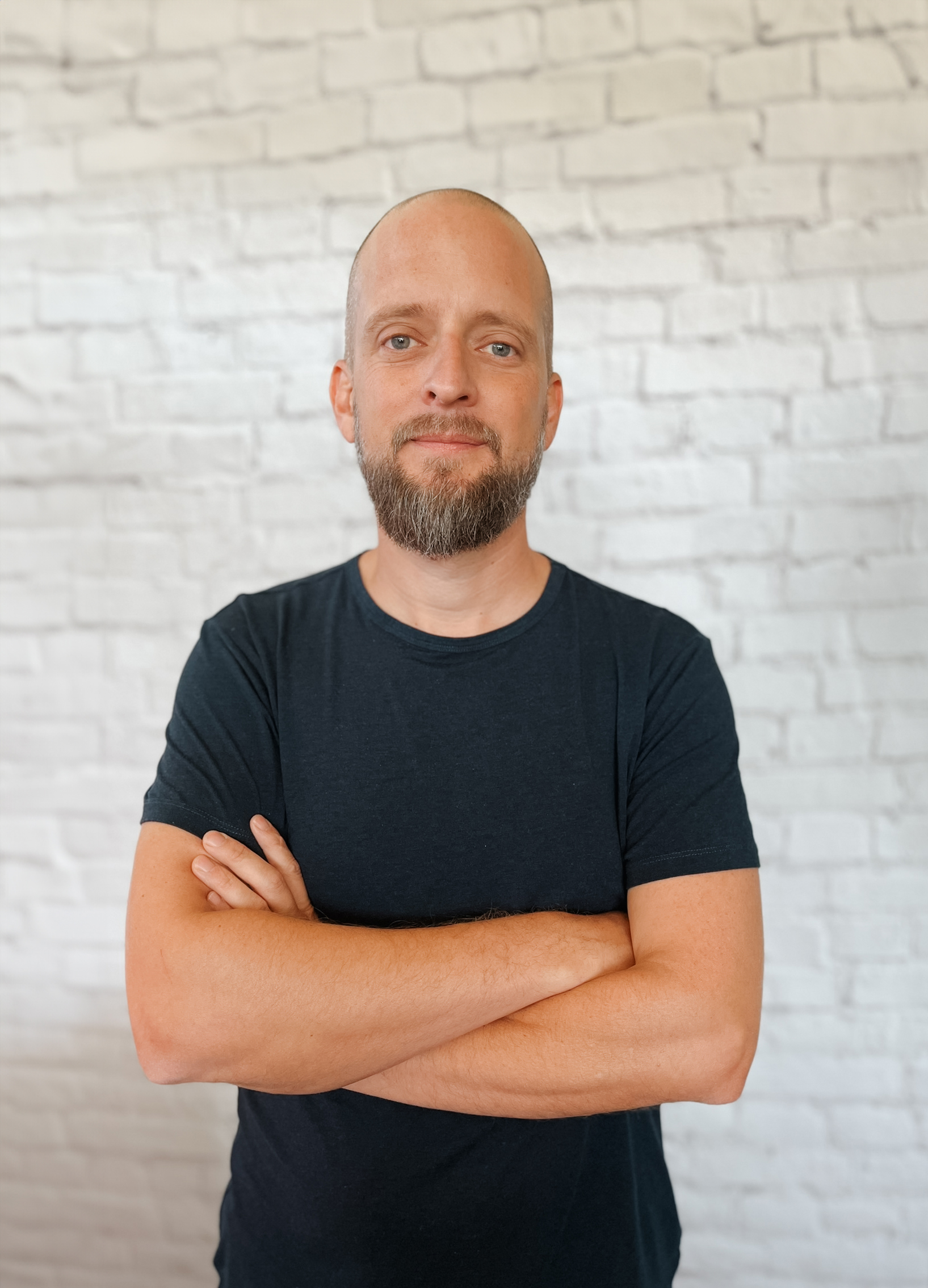Innovation Manager AI
New position at imc

More than just good prompts: The need for an innovation manager for AI
AI is revolutionising the way we work: Interview with Nicolas Schuck
On becoming Innovation Manager AI at imc AG
Nicolas Schuck became imc AG’s innovation manager in charge of artificial intelligence (AI) six months ago. Before that, the role didn’t even exist. It was created because, with applications like ChatGPT growing rapidly, the company needed to up its AI competence.
But let’s start at the beginning. Nicolas has always been interested in new technology. In his former role as imc’s Head of Standard Software Development, he shared responsibility for the ongoing development of the imc Learning Suite. That taught him a lot about the operational and strategic sides of software development.
As for AI, his interest was piqued when GPT-3 burst onto the scene, followed shortly after by ChatGPT. “These technologies opened my eyes to the immense potential of AI. It was at that point that I decided I wanted to work with it more closely. The benefits of AI, particularly the efficiencies and ability to automate repetitive tasks, inspired me to broaden my career focus.”
Another moment of truth for Nicolas was the realisation that AI was no mere passing technology fad. He saw that it was a force for transformation that could revolutionise business processes, workflows and even entire industries. It was then that he knew he wanted to play a central role at imc in driving the implementation and integration of AI technologies.
His new role wasn’t created just like that, of course. It wasn’t even on the agenda. But it only took a few meetings with management and colleagues for the company to see the potential. imc clearly needed a dedicated AI innovation manager. And so, the role was created. Nicolas: “In my new position, I’m not confined to working within a single department; I can work across departments. And that means I can steer the entire organisation toward an AI-supported future.”

The surfer and the perfect wave
For Nicolas, AI’s breakthrough into the mainstream on the back of ChatGPT was the perfect wave. And like any good surfer, he knew it was the one and started paddling frantically to get into position to ride it.
Ultimately, the creation of this new role came down to two things: Nicolas’s individual drive and interest and the company’s openness to new ideas.
Responsibilities: Communication whizz, lecturer & all-round tech professional
Let’s take a closer look at Nicolas’s new role. His responsibilities as Innovation Manager AI are very wide-ranging. The first – and arguably most important – aspect of his job is communication. In a global company like imc, it’s vital to get information across efficiently and clearly. Nicolas’s job is to make sure all employees are kept up to date and have access to the same information. “It’s important for me to emphasise that we are mastering the new challenges together as a team,” he says. He started by launching a series of initiatives to ensure that employees both know and understand how these new AI technologies might affect their work and the company as a whole. “The initiatives include regular updates, workshops, webinars and special information events,” Nicolas explains. “The aim is to give everyone the opportunity to ask questions and take an active part in the discussion.”
Another core aspect of his role is enablement: facilitating and supporting employees in the use of AI technologies. This involves Nicolas working closely with various departments to develop training courses, workshops and other learning offerings. Among the highlights here is AI Focus Month, which will be held this autumn. This is an entire month of events and training offerings about AI. All these initiatives are designed to motivate employees and give them the skills they need to use AI effectively in their daily work.
From awareness building to enablement
Employee enablement is a multi-step process that starts with building awareness of what AI can and can’t do. It’s important to cultivate a broad understanding of the technology while also setting realistic expectations. Nicolas explains: “There are a lot of myths and misapprehensions around AI. So, it’s my job to clear those up and ensure everyone knows the facts. And we achieve this through targeted training programmes that cover both theoretical knowledge and practical use cases.”
A third focus of Nicolas’s work is on implementing back-office automation processes. This is where his technical background really comes into its own. Nicolas investigates and assesses various tools and technologies with the potential to automate repetitive tasks and hence boost efficiency. The key is to use locally hosted AI models that meet stringent data security and privacy requirements. That way, the knowledge base integrated into the in-house AI solutions can include sensitive company data.
Nicolas: “Automation is an area that, I believe, has enormous potential. By implementing AI-based solutions, we can automate a lot of time-consuming, repetitive tasks. That gives employees more time for creative and strategic activities. Ultimately, this not only improves efficiency; it also improves job satisfaction because employees are able to focus on tasks that add real value.”

Looking to the future: Rethinking schools and HMI
Nicolas’s vision for the use of AI is ambitious and forward-looking. For him, AI is a force for transformation with the potential to change not just work but society as a whole.
It could, for example, be used for education system reform. Nicolas believes that the targeted use of AI has the potential to free up teaching staff and revolutionise learning processes. “We need to rethink the way we use AI in schools. Instead of trying to use AI watermarking to ensure the integrity of assignments, we should see AI as an opportunity and completely overhaul outmoded approaches. The focus should be on equal opportunities and more effective learning strategies that are based on the latest scientific findings. Artificial intelligence has the potential to transform and modernise the German education system’s outdated structures.”
Another part of Nicolas’s AI vision for the future relates to human-machine interfaces. He believes the next five years will bring fundamental changes to the way we interact with machines and software. “In the near future, we’ll see further improvement in human-machine interaction with technologies like gesture recognition and haptic feedback,” he says. “These innovations will enable more intuitive and natural interactions. For example, they will allow users to physically feel virtual environments and communicate with machines using simple gestures.” Then there’s the development of more human-like interactivity. “It’s exciting to think there will be interactive AI that can conduct nuanced, complex conversations and perform tasks autonomously. These advanced systems will be able to imitate human communication in ways that far outstrip current AI systems. This will bring major efficiencies to everyday situations,” he explains. “In other words, artificial intelligence has the potential to revolutionise the way we interact with computers and software. It could potentially usher in a whole new level of user-friendliness and efficiency.”
Changes through AI: Understanding the limits
AI is already morphing from a highly specific problem-solving technology into a general-purpose solution with applications in many different areas. Nicolas notes that acceptance and integration of AI in companies is growing steadily as employees realise its benefits and possibilities.
At the same time, he stresses, there are limits. While AI can offer major benefits in many areas, there are also challenges and limitations to be aware of. He says we need to be mindful and responsible in our use of these technologies if we are to fully realise its benefits without glossing over the potential risks.

Conclusion
Nicolas Schuck’s shift into the Innovation Manager AI role at imc shows how passion and professional ambition can lead to a new, future-focussed role. Through his work, he is helping to make imc a leader in AI innovation. He is also helping to enable its employees to benefit fully from this technology. His ideas for the future and the changes already implemented show that the judicious use of AI can not only increase efficiency but also bring fundamental change to work methods and learning.
His experience and work at imc demonstrate that the successful use of AI requires more than just technical know-how. It also calls for strategic thinking and good communication.
Nicolas: “Education and dialogue are key to overcoming fears and building acceptance. I fully understand the reservations and fears that employees have. But I also see the huge opportunities that AI offers the company and the teams that work here.”
